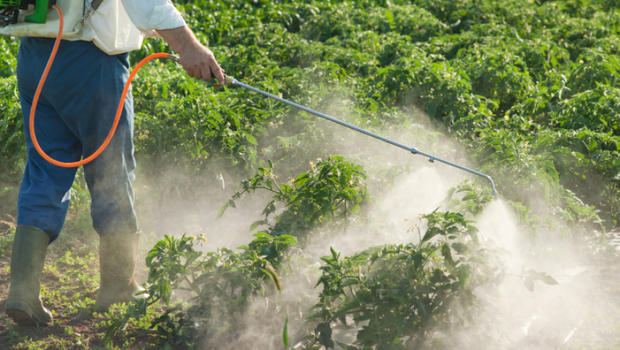Scientists have long hypothesized that chemicals found in our environment play a role in causing autism. Research published this week in Environmental Health Perspectives supports that theory, finding children whose mothers are exposed to agricultural pesticides during pregnancy may be at increased risk for autism spectrum disorders, or ASD.
Researchers at the University of California, Davis, looked at the medical records of 970 participants. They found pregnant women who lived within a mile of an area treated with three different types of pesticides were at a two-thirds higher risk of having a child with ASD or developmental delays. These pesticide-treated areas included parks, golf courses, pastures and roadsides.
The study investigated the use of three classes of pesticides: organophosphates, which include the widely used insecticide chlorpyrifos, as well as pyrtheroids and carbamates.
The study authors also discovered that women exposed to pesticides during their second or third trimesters were even more likely to have a child born with developmental delays or autism.
Until further research determines whether pesticides inside the home pose similar risks, Janie Shelton, one of the study’s authors and a graduate student at UC Davis, advises pregnant woman to limit pesticide exposure as much as possible.
“I would suggest that women who are pregnant or in the process of becoming pregnant avoid using chemicals inside the home,” Shelton said. “Make sure to read the labels and see if any of these chemicals are in the things they use.”
The findings add to the mounting evidence linking autism and developmental delay to pesticide exposure during pregnancy.
“This is the third epidemiological study from California that has shown that prenatal pesticide exposure is associated with ASD,” said Alycia Halladay, senior director of environmental and clinical sciences for Autism Speaks. “It reinforces the advice of public health care experts and doctors to minimize exposure to these chemicals during pregnancy.”
The authors say further research is needed to determine whether a mother’s genes also contribute to the increased risk associated with environmental exposure to pesticides.
Another study published in Pediatrics this week found a link between race and autism spectrum disorders.
The researchers looked at more than 7,500 people and found that children of foreign-born black, Central and South American, Filipino and Vietnamese mothers were at higher risk of developing autism than children of white mothers born in the United States.
This doesn’t necessarily mean that these races are more genetically prone to autism.
“It can be very scary for parents when they hear such high degree of association, but they should also keep in mind that this research is only showing some association and not cause,” William Sharp, director of the Marcus Autism Center and assistant professor at Emory University School of Medicine, wrote in an email. Sharp was not involved with either study.
“Not all pregnant women exposed to pesticides or all immigrants from Central (and) South America go on to have children with autism.”
And experts agree there are many other risk factors that could be at play in increasing the autism risk, such as maternal stress after relocating to the U.S., nutritional deficiencies and/or a lack of access to treatment and diagnosis.
“Both studies highlight the need to further enhance our understanding regarding the relationship between environmental events, fetal and early childhood development and autism,” Sharp wrote.
Source: cnn


